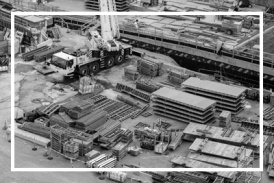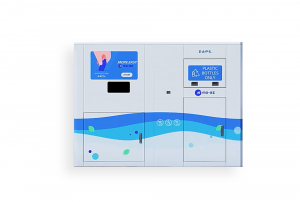EAPS Aims for Global Market with AI-Powered Uncrewed Recycling Robot Mo-EZ
EAPS’s Mo-EZ robot uses AI and sensors to recycle PET bottles without human input, boosting efficiency and targeting global green tech markets.
PANGYO, GYEONGGI-DO, SOUTH KOREA, April 16, 2025 /EINPresswire.com/ -- EAPS (CEO Seung Kwon Park) is transforming the circular resource industry with its AI-based optical sensor and robotics technology, offering an innovative, uncrewed recycling solution.In 2023, EAPS acquired its core technology from the Korea Advanced Nano Fab Center and developed its own AI optical sensor-based multi-feed uncrewed circular resource retrieval robot, Mo-EZ. The company has successfully carried out pilot programs in key regions across South Korea.
Unlike conventional single-input systems, Mo-EZ enables the simultaneous disposal of dozens of PET bottles, offering more than 30 times greater efficiency and enhanced user convenience. It features a hybrid optical sensing system combining SWIR (Short-Wave Infrared) and visible spectrum sensors to sort clear PET bottles automatically. It also integrates 360-degree barcode recognition, enabling precise categorization and compatibility with Deposit Refund Schemes (DRS).
The robot supports real-time monitoring via LTE, Wi-Fi, and RJ45 communication modules. It requires no user registration and involves no monthly fees, making it economically viable and highly accessible to the public.
The system’s technological capabilities have been validated through numerous deployments, including at Incheon SSG Landers Field, Suwon’s Carbon-Neutral Green City Project, Jeonju Hanok Village, Gyeonggi Business & Science Accelerator, Korea Expressway Corporation’s Anseong Matchum Service Area, and Gyeonggi Housing & Urban Development Corporation’s public rental housing. In April 2024, it was also selected for the Ministry of SMEs and Startups’ pilot procurement program for innovative technology products.
EAPS targets national and municipal governments implementing recycling policies, major retail chains (such as Emart), beverage companies (like Coca-Cola), large construction firms, public facility operators, and densely populated urban areas. By deploying the technology in waste-intensive locations, EAPS aims to increase the supply of recyclable materials, create local jobs, and stimulate regional economies through community currency reward systems.
Building on its domestic success, EAPS is preparing to enter overseas markets, focusing on Southeast Asia and Japan. The company is currently discussing project financing with global partner Coca-Cola and is planning POC (Proof of Concept) trials to identify local partners and buyers.
Rooted in human-centered technology, EAPS is committed to creating a sustainable circular resource ecosystem and driving a paradigm shift in global green industry practices.
Pangyo Techno Valley is a global R&D hub that integrates Research (R), People (P), Information (I), and Trade (T) across the IT, BT, CT, NT, and mobility sectors. It is a leading innovation cluster in Gyeonggi-do, established to drive technological innovation, talent development, job creation, and international business competitiveness.
The Gyeonggi Business and Science Accelerator’s Techno Valley Innovation Headquarters has continuously promoted Pangyo Techno Valley’s value by hosting events such as the Pangyo Evening Meet-Up, Pan-Pan Day, and Pangyo Startup Investment Exchange In-Best Pangyo. These initiatives have facilitated networking between Pangyo companies, domestic and international investors, and the media. Similar events are planned for this year to support the growth and global expansion of Pangyo startups through various assistance programs.
Kim Seung Yeon
Gyeonggi Business & Science Accelerator
+82 31-776-4834
email us here
Visit us on social media:
Facebook
LinkedIn
Instagram
YouTube
Other
Legal Disclaimer:
EIN Presswire provides this news content "as is" without warranty of any kind. We do not accept any responsibility or liability for the accuracy, content, images, videos, licenses, completeness, legality, or reliability of the information contained in this article. If you have any complaints or copyright issues related to this article, kindly contact the author above.
Non-invasive Surgical Wound Closure Market Growth at 4.1% CAGR
Reflective Air Packaging Market to Surpass USD 15,089.37 Million by 2035, Driven by Thermal Protection Needs | FMI
Major Study Reveals Which Perth Real Estate Agencies Have the Most Demanding Bond Cleaning Requirements
Kalendarium
Więcej ważnych informacji
 Jedynka Newserii
Jedynka Newserii

 Jedynka Newserii
Jedynka Newserii

Transport

Import materiałów budowlanych z Rosji zagrożeniem dla konkurencyjności europejskiego rynku. Konieczne są zmiany i egzekwowanie sankcji
Unia Europejska powinna zrewidować politykę celną na import materiałów budowlanych spoza państw członkowskich, w tym państw wschodnich – twierdzą uczestnicy konferencji „Bezpieczeństwo gospodarcze UE”. Obecnie Wspólnota nakłada na europejskich producentów coraz więcej ograniczeń, nie rewidując polityki celnej, co przekłada się na systematyczne osłabienie konkurencyjności przedsiębiorstw, spadek produkcji i zagrożenie dla miejsc pracy.
Konsument
Polacy odczuwają brak wiedzy na temat inwestowania. Może to sprzyjać podejmowaniu nieracjonalnych decyzji finansowych

Co trzeci Polak odczuwa brak wiedzy w obszarze inwestowania, a tylko co piąty chciałby pogłębić swoją wiedzę na ten temat – wynika z badania „Poziom wiedzy finansowej Polaków 2025”. Ci, którzy na własną rękę szukają informacji i porad, coraz częściej sięgają do blogów, portali, podcastów i wideo w internecie. Eksperci przestrzegają, że finansowych i inwestycyjnych porad udzielają nie tylko specjaliści w danej dziedzinie, więc potrzebna jest zasada ograniczonego zaufania.
Handel
Do 2030 roku liczba plastikowych opakowań w e-handlu modowym może się podwoić. Ich udział najszybciej rośnie w Polsce

Wraz ze wzrostem kanału e-commerce w branży modowej rośnie liczba wykorzystywanych opakowań, z których znaczną część wciąż stanowią te z plastiku. Do 2030 roku w Polsce e-sprzedawcy zużyją 147 mln plastikowych opakowań – wynika z badania przeprowadzonego na zlecenie DS Smith. Można zauważyć rosnący trend wśród marek modowych, które coraz częściej wybierają opakowania wykonane z papieru lub materiałów z recyklingu. To o tyle istotne, że polscy konsumenci odczuwają wyrzuty sumienia z powodu ilości plastiku, w którym dostarczane są ich zamówienia.
Partner serwisu
Szkolenia

Akademia Newserii
Akademia Newserii to projekt, w ramach którego najlepsi polscy dziennikarze biznesowi, giełdowi oraz lifestylowi, a także szkoleniowcy z wieloletnim doświadczeniem dzielą się swoją wiedzą nt. pracy z mediami.











.gif)

 |
| |
| |
|